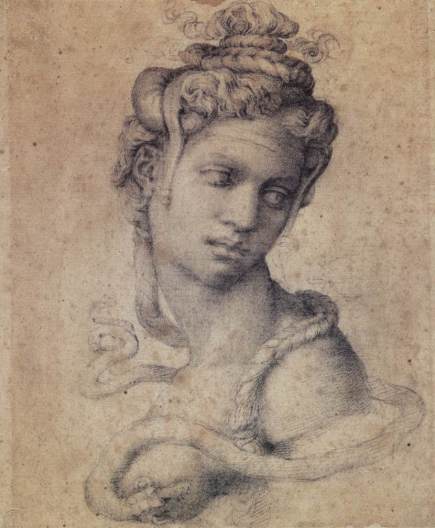Today I went to the Muscarelle Museum of Art at the College of William and Mary, and in honor of the museum’s thirtieth anniversary they held an exhibit titled Michelangelo: Sacred and Profane, Masterpiece Drawings from the Casa Buonarroti.
My whole family went, including a crew of three kids under the age of 9 (I’m sure the museum staff loved us with our loud selves, and our “find the heads in the painting!” games).
The exhibit was a collection of twenty-five Michelangelo drawings. Many of them were sketches of architectural designs, including a plan for the Pichola Libreria of the Laurentian Library and a plan for the Church of San Giovanni dei Fiorentini in Rome.
Other drawings included the iconic Madonna and Child. Like many of his renderings, the female figures are as toned as can be, most likely because many of the times he used male models to draw from life.
“The Christ Child is as robustly muscled and smoothly polished as a piece of sculputre, the artist’s hand made invisible by infinitesimal overlapping touches. The sculptural quality of the Child recalls the perfect beauty of cassical statuary and the Child’s divinity, which is contrasted with the Madonna’s unfinished form.”
What made me the most curious about this drawing was how the paper through out had changed tones to a light brown, but the Child’s highlights were still brilliant and intact. The highlights, after 500 years were still highlighting where the light was coming from and were brighter than the paper itself!
My favorite out of all the drawings, which automatically were narrowed down to a handful mainly because buildings and architecture do not move me at all (unless they have human figures sculpted on them!), was the drawing of Cleopatra given as a gift for Tommaso de’Cavalieri, a young nobleman. A couple of reasons why she was my favorite piece in the exhibition…
First of all she is beautiful. Plain and simple. You could feel those curls curling up and twisting behind her head. You could see her gaze looking down, and the skin in her forehead pushed up making her seem like she is just in anguish, like she knows what her fate is and the snake around her breasts and shoulders only confirms it.
The amazing thing about this drawing is that it wasn’t until twenty-five years ago that after being studied and closely observed, scholars discovered that there was a paper backing that covered the back of the drawing. This revealed a second drawing! This one was of the same Cleopatra yet this time, her look and her facial expression was a more clear reflection of how Michelangelo maybe really wanted to portray anguish and desperation. I wonder what made him change his mind? And I wonder why he covered it with another piece of paper instead of using a new one, and still gave it as a gift?! What was his tricky mind up to?…
Regardless, it was a great exhibition. The best part of it though was when my little soon-to-be-nine-year-old sister says to me “Hey Memi, did you know it was Michelangelo’s birthday today?!?” What? No I did not!
Coincidence? Probably not : )
Happy Birthday Michelangelo!
-Mensa


